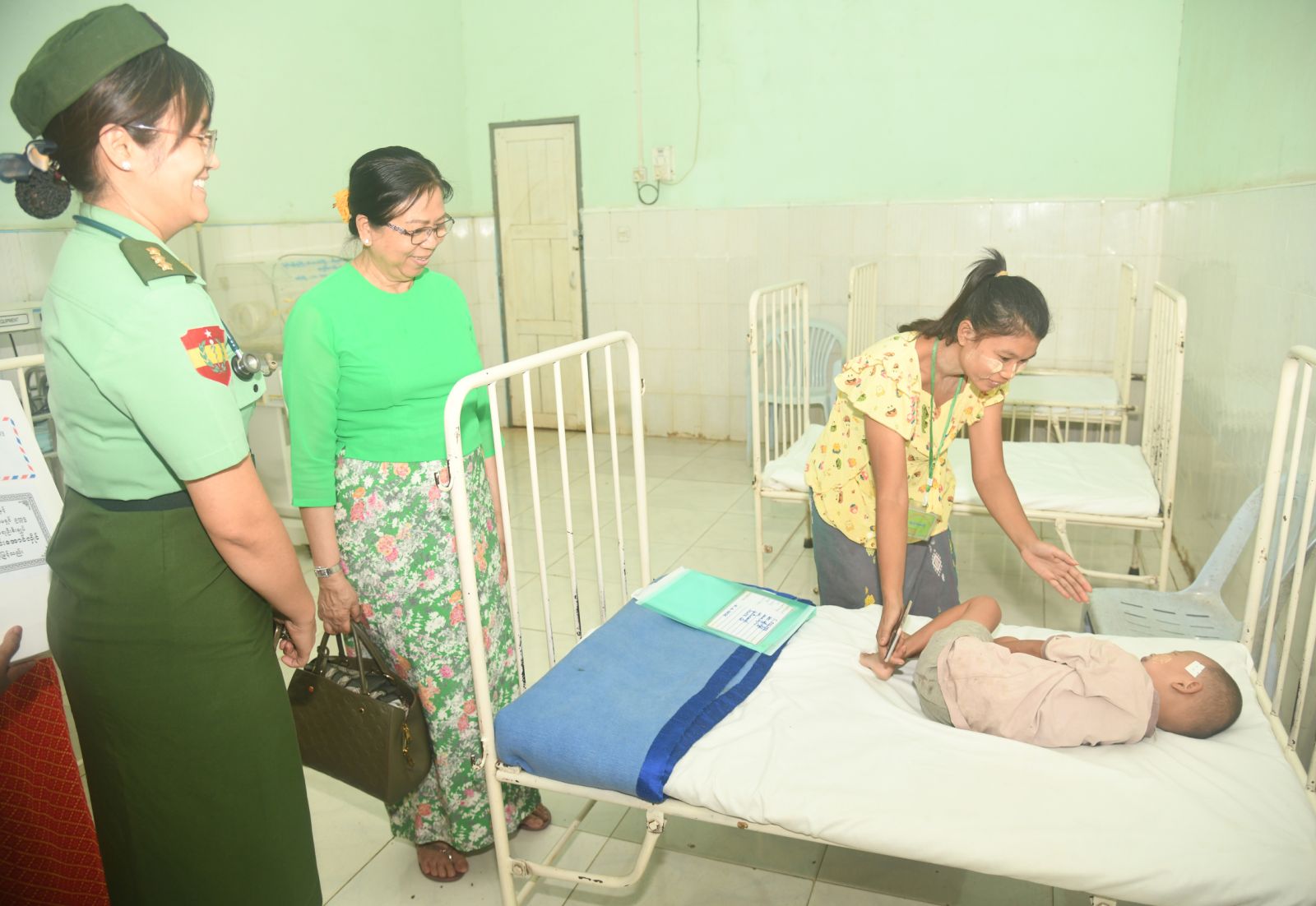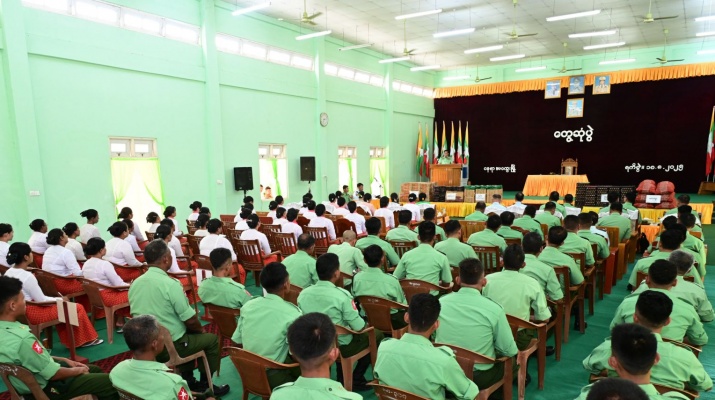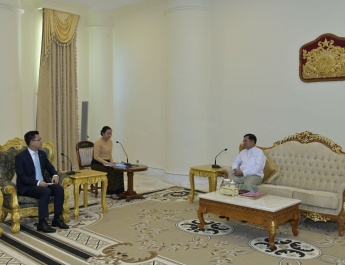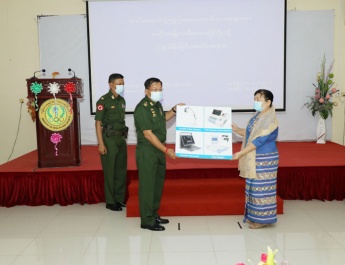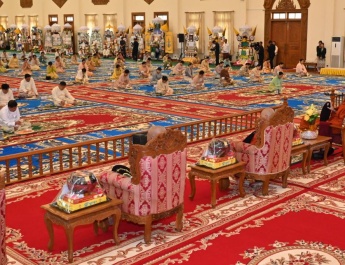Nay pyi taw August 18
Chairman of the State Security and Peace Commission Commander-in-Chief of De-fence Services Senior General Min Aung Hlaing delivered an address to officers, other ranks and families of Magway Station, Central Command, at the hall of the station this afternoon.
Also present at the meeting were Daw Kyu Kyu Hla, the wife of the Senior General, Commander-in-Chief (Air) General Tun Aung and his wife, senior military officers from the Office of the Commander-in-Chief and their wives, the commander of Central Comm-and and his wife, officers, other ranks and families of Magway Station.
The Senior General delivered an address, saying he visited Magway Station frequently and delivered addresses and the Tatmadaw had to assume State responsibilities due to voting irregularities in the 2020 multi-party general election. Opposition political parties that did not want to work with the Tatmadaw politically committed irregularities to win the election. It could be seen that the country adopted a parliamentary system after regaining independence and centralization under socialism later. Political differences led to internal instabilities and the country had to overcome crises. During such periods, the Tatmadaw had to take measures for the stability of the country.
The biggest challenge during political instabilities were separatist activities in states. As the country faced political differences, there were rivalries between the socialism and democratic systems in the inter-national arena. During that period, the SEATO was formed in Southeast Asia. There were rivalries between communism and democratic systems, according to historical evidence.
During the times when the country took the path under socialism, there were political differences, which were caused by restrictions imposed on private businesses under socialist economic systems. Similarly, unity also collapsed in the administrative sector.
In 1988, the Tatmadaw had to assume State responsibilities and took measures to take the path of the democratic system. An election was held in 1990 under unicameral Hluttaw and steps were taken to draft a constitution. A constitutional assembly was formed to draft the 1947 constitution. Similarly, the 1990 election was held to draft a constitution.
The Tatmadaw exerted efforts to enable the country to take the multi-party democratic path aspired by the people and the constitution (2008) was drafted before approving it at a referendum. In 2010, the country began to adopt multi-party democracy and the Tatmadaw has continued to make efforts to enable the country to move forward along the democratic path firmly.
During the term of the first democratic government, efforts were made to take the democratic path firmly. During the tenure of the second democratic government, state responsibilities were carried out under foreign interference of so-called democracy liberalism and foreign advisors were appointed. Rhetoric and instigation causing hatred against the Tatmadaw were made explicitly or implicitly. Similarly, the country faced a total failure in economic, administrative and other various sectors because it failed to carry out its tasks successfully. Importantly, attempts were made to reject the centrality of the Tatmadaw based on hatred over past events.
The second democratic government attempted to cause voting irregularities in the 2020 multi-party democracy general election to retain its hold on power. The Tatmadaw urgedit to solve the voting irregularities repeatedly but it refused to do so and attempted to retain the State power forcefully. There-fore, the Tatmadaw had to assume State responsibilities by declaring a state of emergency in the country.
When we assumed state responsibilities, protests and demonstrations occurred, leading to violent attacks and killings. These issues, arising from political disagreements, must be resolved politically. To conduct elections, a population and household census was carried out in 2024 to ensure accurate voter lists. It was announced today that the election will commence on December 28.
Regarding amendments to the constitution, the Tatmadaw agrees to make certain amendments in accordance with rules and regulations. The Tatmadaw will cooperate in ensuring a proper democratic system and will fulfill its duty to protect the nation. When the election is held and the winning party assumes state responsibilities, military representatives in the parliament will participate in national affairs. The Tatmadaw will also engage in the national political role assigned by the constitution and protect it. The military’s role is not to engage in politics but to serve in national defence tasks.
All military personnel originate from the public, and the Tatmadaw is a part of the state. Therefore, it is necessary to carry out defence tasks to ensure the safety of the people’s lives and property.
Due to weaknesses in education in our country, efforts are being made to improve educational standards. Weaknesses in education lead to deficiencies in individuals’ thinking and foresight. Only when the country has an abundance of educated people can development efforts be advanced further. Educated youth with high critical thinking skills can contribute to the nation’s stability and peace. The Tatmadaw has also worked to enhance the education of its personnel and their families. We must encourage our child-ren to become educated youth capable of critical thinking.
In performing duties, mutual respect between ranks is essential to becoming good soldiers. During the election to be held in December, candidates should be selected based on their ability to serve the nation’s interests with goodwill. Citizens should vote diligently to fulfill their duties as good citizens. International observers will also visit to monitor the election process. We must prepare to ensure that the incoming government can genuinely serve the nation’s interests.
Subsequently, the Senior General provided food and supplies to officers, other ranks, and their families in the military region. The Senior General’s wife also provided financial support to the military region’s maternal and child welfare association, which was received by the station commander and his wife, respectively.
At the conclusion of the meeting, the Senior General, his wife, and entourage warmly greeted the attending officers, other ranks, and their families.
Afterward, the Senior General visited the local military hospital, meeting with officers, other ranks, militia members, and Myanmar Police Force personnel who were injured while performing national defense and security duties. He inquired about their injuries and recovery progress, offered words of encouragement, and addressed their needs.
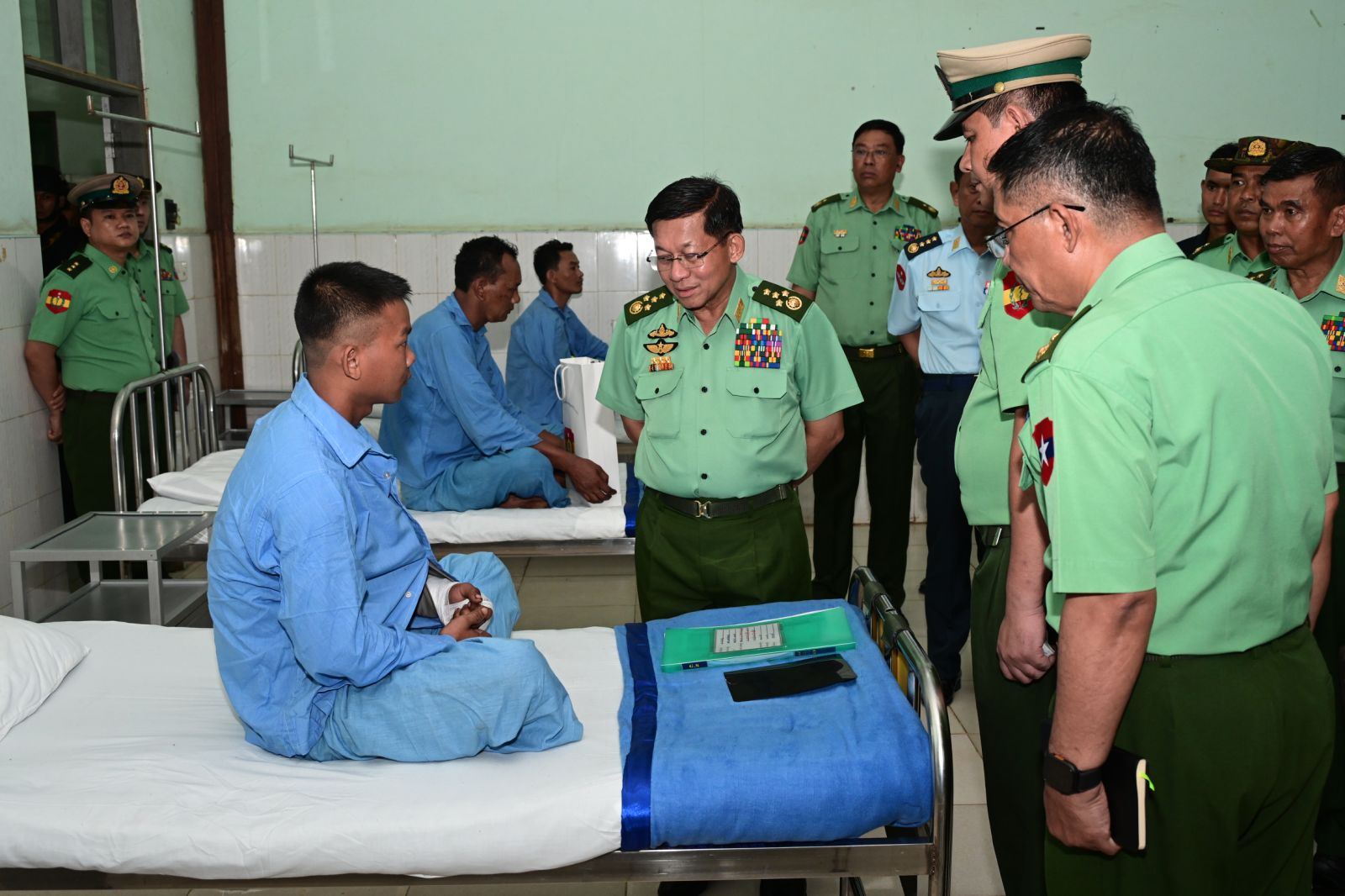
The Senior General also inquired about the hospital’s requirements and ensured that necessary support was provided.
Similarly, the Senior General’s wife visited the families of the officers and other ranks receiving treatment at the hospital, inquired about their health conditions, offered words of encouragement, and provided food and supplies.
